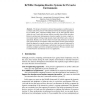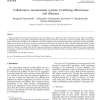137 search results - page 24 / 28 » Semantics for Modelling Reason-Based Preferences |
143
click to vote
DSVIS
2008
Springer
15 years 4 months ago
2008
Springer
The design of interactive software that populates an ambient space is a complex and ad-hoc process with traditional software development approaches. In an ambient space, important ...
149
click to vote
IAT
2007
IEEE
15 years 2 months ago
2007
IEEE
User profiling is a fundamental task in Web personalization. Fuzzy clustering is a valid approach to derive user profiles by capturing similar user interests from web usage data a...
131
click to vote
ESWA
2008
15 years 2 months ago
2008
Recommender systems base their operation on past user ratings over a collection of items, for instance, books, CDs, etc. Collaborative filtering (CF) is a successful recommendatio...
123
click to vote
IJAOSE
2010
15 years 1 months ago
2010
CASO is an agent-oriented programming language based on AgentSpeak(L), one of the most influential abstract languages based on the BDI (Beliefs-Desires-Intentions) architecture. ...
123
click to vote
ACL
2009
15 years 10 days ago
2009
In this paper, we analyze the impact of different automatic annotation methods on the performance of supervised approaches to the complex question answering problem (defined in th...


